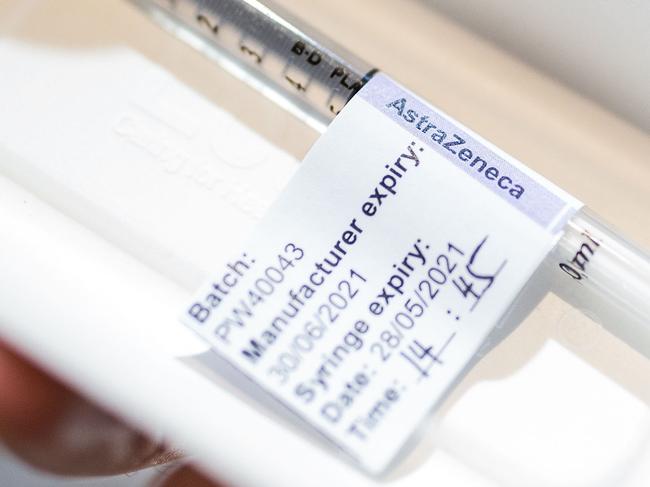Eight new cases of blood clots related to AstraZeneca vaccine reported
Blood clotting cases related to the AstraZeneca vaccine rollout have risen sharply as one patient was transferred into intensive care.
Eight new cases of blood clots have been linked to the AstraZeneca vaccine rollout, with one patient rushed into intensive care.
The number of Australians affected by blood clots during the Covid vaccine rollout has now topped 40, according to the federal government’s health body.
The Therapeutics Goods Association (TGA) reported four confirmed cases of thrombosis with thrombocytopenia syndrome (TTS) likely to be linked to the AstraZeneca vaccine, and another four deemed probable.

The four confirmed cases were a 40-year-old Victorian woman, being treated in NSW, a 70-year-old Victorian woman, an 82-year-old NSW woman and a 70-year-old man from Queensland.
The four cases classified as probable were a 72-year-old man from South Australia, a 61-year-old woman from NSW, and a 73-year-old man and 67-year-old woman, both from Queensland.
“One of the newly confirmed patients is currently critically unwell and is in intensive care,” the TGA revealed in its latest report.
The TGA would not confirm which state the intensive care patient was from.
It takes the number of confirmed cases to 31, along with 10 probable cases, all related to the rollout of the AstraZeneca Covid-19 vaccine.
Of those who suffered, or are believed to have suffered, vaccine-related blood clots, 13 are in hospital and four have been discharged but require outpatient medical care.
Another 23 have been discharged from hospital and are recovering, while one has died, the TGA said in its weekly report.
“Nine of these 41 cases were more serious and required treatment in intensive care for a period of time,” the report stated.

Overall, there have been 16,983 adverse reports for the AstraZeneca vaccine and 7205 linked to Pfizer inoculations, or 5.8 per 1000 doses, since the rollout started.
The most common reactions for those who received the AstraZeneca jab last week were headache, fever, muscle pain, fatigue and chills, while those who received Pfizer reported headaches, muscle pain, lethargy, joint pain and nausea.
“When we compare the confirmed and probable TTS cases reported in Australia to those reported by overseas regulators, it appears that a smaller proportion of Australian cases are of a very serious nature, involving unusual blood clots, such as cerebral venous sinus thrombosis (CVST) which occur in the brain or clots in major abdominal veins, including those in the spleen or liver,” the report stated.
“The most common time period for onset of TTS symptoms is 4-30 days after vaccination.
“With the ongoing risk of COVID outbreaks in Australia and the potential for severe long-term effects or fatal consequences of infection, the benefits for the AstraZeneca vaccine continue to outweigh the risks.”


